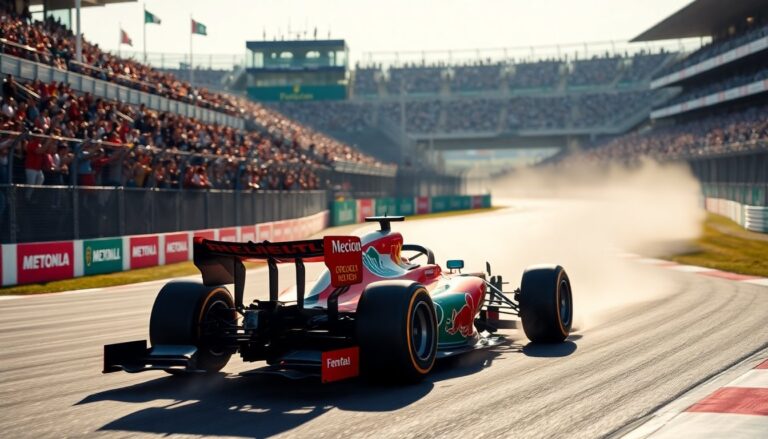Argomenti trattati
The Mexican Grand Prix, held at the iconic Autódromo Hermanos Rodríguez, delivered an exhilarating afternoon of motorsport. Renowned for its vibrant atmosphere and passionate fans, this race featured drivers battling for supremacy on a challenging circuit. The event was marked by intense competition, strategic maneuvers, and unexpected twists that kept spectators engaged.
Max Verstappen, the reigning world champion, started the race from fifth position, a challenging spot that required both skill and tactics. As the lights went out, drivers jostled for position on the long run to the first corner, setting the stage for a gripping showdown.
Early race challenges
As the race commenced, Verstappen quickly capitalized on the slipstream, overtaking competitors, including George Russell from Mercedes. His aggressive approach nearly led to disaster when he found himself battling alongside Ferrari drivers, causing him to veer wide over the curbs and onto the grass. This moment of uncertainty dropped him back to fourth, while Lando Norris, who had started from pole position, maintained his lead.
Strategic tire choices
While most frontrunners opted for soft tires, Verstappen chose medium tires, a decision that posed its own challenges. The initial laps were intense, as he fought to maintain pace against faster competitors. “It was a bit of a struggle early on, but we managed to survive the first stint, which was crucial,” Verstappen later explained. His strategy involved extending tire life while waiting for the right moment to switch to soft tires later in the race.
As the race progressed, Verstappen pressured Lewis Hamilton, who also struggled with his tire strategy. Their fierce track battle showcased the skill and determination of both drivers, with Verstappen narrowly avoiding penalties amidst the chaos. This relentless pursuit eventually allowed him to break free and gain valuable ground.
Mid-race developments and pit strategies
By lap 24, Verstappen finally had clear air as the leaders began to pit. His patience paid off when he made his own pit stop on lap 38, switching to soft tires, which dramatically improved his performance. Although this change initially dropped him to eighth place, the fresh tires soon allowed him to carve through the field. With other drivers opting for a two-stop strategy, Verstappen committed to staying out longer, a gamble that proved vital.
Chasing the podium
The latter stages of the race saw Verstappen climb back up the ranks, overtaking Hamilton again and aiming for a podium finish. With each passing lap, he closed in on Charles Leclerc, the Ferrari driver in second place. By lap 68, Verstappen was within striking distance, ready to make his move when disaster struck: a Virtual Safety Car was deployed due to Carlos Sainz’s car stopping on track.
This unexpected turn of events neutralized the race, preventing Verstappen from launching a final attack on Leclerc. Although he expressed frustration at the timing, he acknowledged that racing luck can swing in unpredictable directions. “You win some, you lose some,” he noted, reflecting on motorsport’s inherent unpredictability.
Race conclusion and championship implications
As the checkered flag waved, Lando Norris emerged victorious, with Charles Leclerc securing second place and Verstappen finishing a commendable third. This result not only highlighted Verstappen’s racing acumen but also underscored the complexities of championship battles. After the race, he faced questions about the championship standings, where he now trails Norris by 36 points.
Despite the challenges, Verstappen remains determined, stating, “We need to have perfect weekends from here on. It’s a tough road ahead, but we’re still in the fight.” His recognition of the need for consistent performance reflects a champion’s mindset, one that fans and analysts will be watching closely in the races to come.

